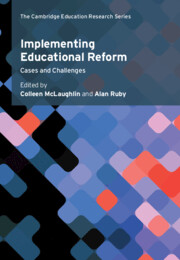Book contents
- Implementing Educational Reform
- Implementing Educational Reform
- Copyright page
- Contents
- Figures and Tables
- Contributors
- Preface
- 1 Why Focus on Implementation in Education Reform?
- 2 Promoting Equity in Education through System Change
- 3 A Decade of Reform in Hong Kong
- 4 Reforming a Whole School System
- 5 The Challenges and Opportunities of Greater Autonomy for Post-Soviet Universities
- 6 School Improvement by Design
- 7 Promising Practice in Government Schools in Vietnam
- 8 Reform Implementation Lessons
- 9 Qatar’s Road to Education Reform
- 10 Implementing Educational Reform
- Index
- References
8 - Reform Implementation Lessons
A Case Study of High-Performing Singapore
Published online by Cambridge University Press: 19 November 2021
- Implementing Educational Reform
- Implementing Educational Reform
- Copyright page
- Contents
- Figures and Tables
- Contributors
- Preface
- 1 Why Focus on Implementation in Education Reform?
- 2 Promoting Equity in Education through System Change
- 3 A Decade of Reform in Hong Kong
- 4 Reforming a Whole School System
- 5 The Challenges and Opportunities of Greater Autonomy for Post-Soviet Universities
- 6 School Improvement by Design
- 7 Promising Practice in Government Schools in Vietnam
- 8 Reform Implementation Lessons
- 9 Qatar’s Road to Education Reform
- 10 Implementing Educational Reform
- Index
- References
Summary
Singapore is an improbable success story in the design and implementation of education reforms that transformed a small, resource starved port into a nation, indispensable to first the region, then globally. This chapter illustrates policy formulation and implementation challenges in unifying a school system that had been segmented by media of instruction to aid rapid and transformative industrialisation. It refers to the successes in enhancing access to education and the difficulties posed by hasty and poorly implemented policy of school bilingualism and documents how these were overcome. This globally oriented system embraced choice, competition and branding and changed curricular and pedagogic frameworks, enhanced TVET, re-positioned the universities and upgraded teacher education. While this has underpinned a system which ranks highly in all international comparisons of educational quality, the policies and practices are not a package or simple formula for others to embrace, they are a product of time and place and are likely to change as Singapore looks to the future.
- Type
- Chapter
- Information
- Implementing Educational ReformCases and Challenges, pp. 149 - 170Publisher: Cambridge University PressPrint publication year: 2021



